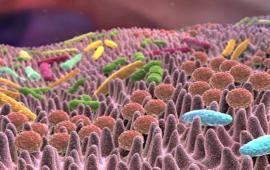
Helicobacter Pylori natural treatment
Infection with the bacteria Helicobacter pylori has been shown to be the cause of more than 90% of duodenal ulcers and 80% of gastric ulcers. It causes chronic inflammation of the mucosa of the stomach and duodenum. In addition, it increases the risk of stomach cancer up to six times. According to data from the US Center for Disease Control and Prevention, around 66% of the world's population suffers from this infection, being more common in developed countries.
Helycobacter pylori produces an enzyme called “urease” that transforms urea into ammonia. Ammonia is toxic to the epithelial cells of the stomach and duodenum.
People who suffer from chronic Helicobacter pylori infection may present symptoms such as:
- Abdominal swelling
- Belching
- Nausea
- Abdominal pain
- Fatigue
- Heartburn
- Halitosis (bad breath)
- Lack of appetite
It is diagnosed by a breath test or the detection of Helicobacter pylori antigen in feces.
Conventional treatment consists of the association of several antibiotics for 14 days, but in many cases 100% eradication is not achieved due to resistance. The problem with conventional treatment is the side effects associated with antibiotic treatment, resistance and the frequency of recurrence after treatment of the infection.
A strong and healthy digestive system does not allow Helicobacter pylori to nest.
Correct acid secretion in the stomach and a healthy intestinal flora are needed, therefore, the natural treatment of Helicobacter pylori should be aimed at eradicating the bacteria and balancing and enhancing digestive function.
In recent years, there has been growing interest in the scientific community in demonstrating the efficacy and mechanisms of various plants that have proven effective in the treatment of gastric ulcers in traditional Chinese medicine.
An important aspect is treatment with probiotics to regulate the bacterial flora which have demonstrated their effectiveness through studies in the eradication of this bacteria. These studies show which probiotics have shown the best results and at what doses they have been administered.
On the other hand, different Chinese plants have been investigated and used successfully for the treatment of gastric and duodenal ulcers combined in multi-plant formulas.
The plant Glycyrrhiza glabra inhibits the adhesion of the bacteria to the gastric mucosa and has a bactericidal effect against Helicobacter pylori.
Rizhoma Coptidis contains a high concentration of Berberine and has been shown to be able to inhibit the bacteria's production of urease, thus hindering its survival in the mucosa.
In my experience, the Chinese herbs formula, probiotics to restore the intestinal flora at the appropriate doses and personalized diet to strengthen the digestive system, it works to eradicate Helicobacter pylori and prevent relapses. It can also be used as a post-treatment treatment with antibiotics to strengthen the digestive system and alleviate the side effects of antibiotic therapy.
Scientific studies on the treatment of Helicobacter pylori with Glycyrrhiza glabra
2016 -. Hajiaghamohammadi AA et al. To evaluate the effect of adding liquorice to the standard treatment regimen of Helicobacter pylori. Braz J Infect Dis. 2016 Nov - Dec;20(6):534-538. doi: 10.1016/j.bjid.2016.07.015
2016. Cao D, Jiang J et al. The Protective Effects of 18β-Glycyrrhetinic Acid on Helicobacter pylori-Infected Gastric Mucosa in Mongolian Gerbils. Biomed Res Int. 2016;2016:4943793. doi: 10.1155/2016/4943793.
2013. Rahnama M et al. The healing effect of licorice (Glycyrrhiza glabra) on Helicobacter pylori infected peptic ulcers. J Res Med Sci. 2013 Jun;18(6):532-3.
2013. Asha MK, Debraj D et al. In vitro anti-Helicobacter pylori activity of a flavonoid rich extract of Glycyrrhiza glabra and its probable mechanisms of action. J Ethnopharmacol. 2013 Jan 30;145(2):581-6. doi: 10.1016/j.jep.2012.11.033.
2013.
Ask for opinion and find an appropriate solution to your problem
ONLINE Doctor Consultation

